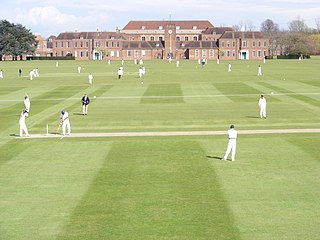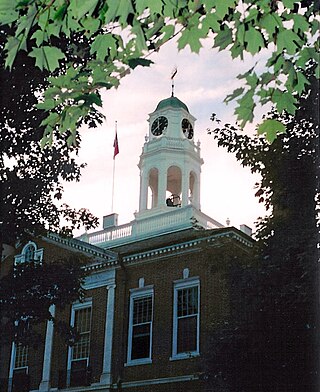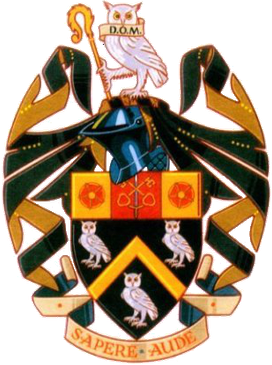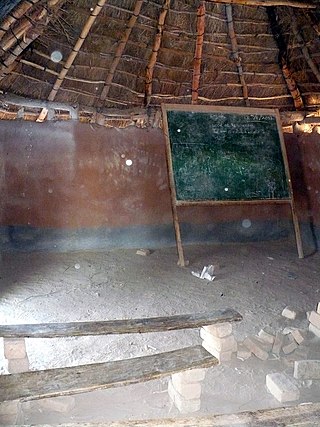
A student is a person enrolled in a school or other educational institution.

Private schools in the United Kingdom are schools that require fees for admission and enrollment. Some have financial endowments, most are governed by a board of governors, and are owned by a mixture of corporations, trusts and private individuals. They are independent of many of the regulations and conditions that apply to state-funded schools. For example, the schools do not have to follow the National Curriculum, although many such schools do.
Education in England is overseen by the Department for Education. Local government authorities are responsible for implementing policy for public education and state-funded schools at a local level. State-funded schools may be selective grammar schools or non-selective comprehensive schools. All state schools are subject to assessment and inspection by the government department Ofsted. England also has private schools and home education; legally, parents may choose to educate their children by any suitable means.
Education in Scotland is provided in state schools, private schools and by individuals through homeschooling. Mandatory education in Scotland begins for children in Primary 1 (P1) at primary school and ends in Fourth Year (S4) at secondary school. Overall accountability and control of state–education in Scotland rests with the Scottish Government, and is overseen by its executive agency, Education Scotland, with additional responsibility for nursery schools being the joint responsibility of both Education Scotland and the Care Inspectorate. Scotland's private schools are overseen by the Scottish Council of Independent Schools. Children in Scotland sit mandatory National Standardised Assessments in Primary 1 (P1), Primary 4 (P4), Primary 7 (P7) at the end of primary school, and Third Year (S3) in secondary school, which assist in monitoring children's progress and providing diagnostic data information to support teachers' professional judgement.

Education in Germany is primarily the responsibility of individual German states, with the federal government only playing a minor role.

Education in France is organized in a highly centralized manner, with many subdivisions. It is divided into the three stages of primary education, secondary education, and higher education. Two year olds do not start primary school, they start preschool. Then, by the age of six, a child in France starts primary school and soon moves onto higher and higher grade levels until they graduate.

A state school, public school, or government school is a primary or secondary school that educates all students without charge. Such schools are funded in whole or in part by taxation and operated by the government of the state.

A private school is a school not administered or funded by the government, unlike a public school.

The Manchester Grammar School (MGS) in Manchester, England, is the largest private day school for boys in the United Kingdom. Founded in 1515 as a free grammar school next to Manchester Parish Church, it moved in 1931 to its present site at Rusholme. In accordance with its founder's wishes, MGS remains a predominantly academic school and belongs to the Headmasters' and Headmistresses' Conference.

The system of education in Uganda has a structure of 7 years of primary education, 6 years of secondary education, and 3 to 5 years of post-secondary education. Education in Uganda is administered in English. All throughout the levels in the education structure, modules are taught and assessed in English. The government of Uganda recognizes education as a basic human right and continues to strive to provide free primary education to all children in the country. However, issues with funding, teacher training, rural populations, and inadequate facilities continue to hinder the progress of educational development in Uganda. Girls in Uganda are disproportionately discriminated against in terms of education; they face harsher barriers when trying to gain an education and it has left the female population disenfranchised, despite government efforts to close the gap.
Education in Kenya refers to the education system in Kenya. It is considered a basic right that should be offered to every individual. Education in Kenya predates to as early as the 18th century among the Swahili people. The earliest school was established by missionaries in Rabai. During the colonial era, the number of Kenyans with exposure to education steadily increased and a good number of them were privileged to proceed abroad for further education.

Bristol Cathedral Choir School is a mixed gender non-selective musical Secondary Academy, located in the Cabot area of Bristol, England. Until 2008 it was Bristol Cathedral School, part of Bristol Cathedral, in the centre of the city. The choristers at Bristol Cathedral are educated at the school, which has a strong musical tradition. The new school is a day school and has no boarders. The school admits some pupils each year based on musical aptitude, as well as admitting probationary choristers. That is the school's only form of selection, all other pupils are chosen at random via a lottery system.

Lower education in Zambia is divided into three levels and these are namely: primary, junior secondary and upper secondary. Higher education in Zambia has improved in the recent years due to the increase of private universities and colleges. The biggest university is the public University of Zambia which is located in the capital city of Lusaka along the great east road and hosts a number of local and international students. The Copperbelt University is the second largest public university and is located in the Copperbelt province of Zambia in Kitwe, and the youngest public university is Mulungushi University, with its main campus 26 km north of Kabwe. There are many other smaller universities, both public and private including the following: Texila American University, Zambia Open University, European University Zambia Zambia Catholic University, Cavendish University, Zambia Adventist University, Northrise University, University of Lusaka, Lusaka Apex Medical University, Woodlands University College, Copperstone University College, University of Barotseland, University of Africa, Information and Communication University, Kwame Nkrumah University of Education, Chalimbana University, Rusangu University, Robert Makasa University, Zambia Centre of Accountancy Studies and there are various Health training Institutes offering Diplomas in clinical medicine Registered Nursing

The Sutton Trust is an educational charity in the United Kingdom which aims to improve social mobility and address educational disadvantage. The charity was set up by educational philanthropist, Sir Peter Lampl in 1997.
The system of education in Iceland is divided in four levels: playschool, compulsory, upper secondary and higher, and is similar to that of other Nordic countries. Education is mandatory for children aged 6–16. Most institutions are funded by the state; there are very few private schools in the country. Iceland is a country with gymnasia.

Miss Edgar's and Miss Cramp's School (ECS) is an independent school for girls that is located in Westmount, Quebec. It is situated near other QAIS schools, including Selwyn House School and The Study. The school teaches students from Kindergarten up to Grade 11.

Tavistock College is a coeducational secondary school and sixth form located in Tavistock, Devon, England. It had approximately 1800 pupils. The schools draws pupils from a catchment area of about 20 km (12 mi) radius.

Perth Academy is a state comprehensive secondary school in Perth, Scotland. It was founded in 1696. The institution is a non-denominational one. The school occupies ground on the side of a hill in the Viewlands area of Perth, and is within the Perth and Kinross Council area.

Education in Jersey is overseen by the Department for Children, Young People, Education and Skills. The Government is responsible for all Government-maintained schools on the island, including the Further Education College, Highlands College, as well as the fee-paying schools of Victoria College and Jersey College for Girls. There are also independent schools and religious schools, including De La Salle College, Beaulieu Convent School and St Michael's School.

The Japanese School in London is a Japanese international school in Acton, London Borough of Ealing. The school is incorporated as The Japanese School Limited. The Japanese Saturday School in London, a Japanese supplementary school, is a part of the institution.















